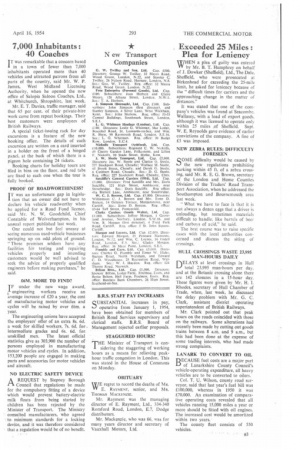Exceeded 25 Miles : Plea for Leniency
Page 37

If you've noticed an error in this article please click here to report it so we can fix it.
'WHEN a plea of guilty was entered TV by Mr. B. T. Humphrey on behalf of J. Dowker (Sheffield), Ltd., The Dale. Sheffield, who were prosecuted at Birkenhead for exceeding the 25-mile limit, he asked for leniency because of the "difficult times for carriers and the approaching change in the matter of distances." It was stated that one of the company's vehicles was found at Seacombe. Wallasey, with a load of export goods. although it was licensed to operate only within 25 miles ,of Sheffield. Supt. W. E. Reynolds gave evidence of earlier convictions of the company. A fine of £3 was imposed.
NEW ZEBRA RULES: DIFFICULTY FORESEEN
SOME difficulty would be caused by the new regulations prohibiting parking within 45 ft. of a zebra crossing, said Mr. R. E. G. Brown, secretary of the London and Home Counties Division of the Traders' Road Transport Association, when he addressed the Southampton and Bournemouth area last week. "What we have to face is that itis not always a dozen eggs that a driver is unloading, but sometimes materials difficult to handle, like barrels of heel. and carboys of acid," he said. The best course was to raise specific cases with the local authorities concerned and discuss the siting of crossings.
HULL CROSSINGS WASTE 23,995 MAN-HOURS DAILY
DELAYS at level crossings in Hull total 23,995 man-hours per day. and at the Botanic crossing alone there are 142 closures in a 15-hour day. These figures were given by Mr. H. I, Rhodes, secretary of Hull Chamber of Trade, when, last week, he discussed the delay problem with Mr. G. C. Clark, assistant district operating superintendent of British Railways, Mr. Clark pointed out that peak hours on the roads coincided with those on the railways. Some alterations had recently been made by cutting out goods trains between 8 a.m. and 9 a.m., but this had been done at the expense of some trading interests, who had made strong complaints.
LANARK TO CONVERT TO OIL
BECAUSE fuel costs are a major part of Lanarkshire County Council's vehicle-operating expenditure, all heavy vehicles are to be converted to oilers. Col. T. U. Wilson, county road surveyor, said that last year's fuel bill was £100,000, whereas in 1950 it was £70,000. An examination of comparative operating costs revealed that all vehicles running 15,000 miles a year or more should be fitted with oil engines_ The increased cost would be amortized within two years.
The county fleet consists of 550 vehicles.




















































































